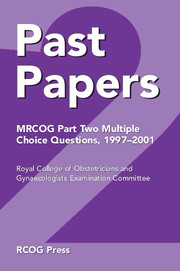March 2000
Published online by Cambridge University Press: 05 July 2014
Summary
Congenital anomalies that can be diagnosed by ultrasound imaging at 18 weeks of gestation include
1. Down syndrome.
2. congenital dislocation of the hip.
3. congenital adrenal hyperplasia.
4. phocomelia.
Regarding the fetal heart,
5. The risk of abnormality is 1:10 if a mother has congenital heart disease.
Abnormally high serum concentrations of human chorionic gonadotrophin in pregnancy are associated with
6. fetal erythroblastosis.
7. chorioangioma of the placenta.
8. maternal alcoholism.
Diagnostic amniocentesis at 16 weeks of gestation is associated with an increased incidence of
9. talipes equinovarus.
10. neonatal respiratory difficulty.
11. meconium ileus.
Analysis of a sample of amniotic fluid obtained by amniocentesis assists in the diagnosis of
12. Tay-Sachs disease.
13. beta-thalassaemia.
14. spina bifida occulta.
15. oesophageal atresia.
Antenatal fetal blood sampling
16. from the umbilical artery rather than from the umbilical vein is associated with more fetal complications.
17. from the placental cord insertion ensures a fetal rather than a maternal sample.
18. is regularly performed between 14 and 16 weeks of gestation.
19. has a fetal loss rate independent of the indication.
Duchenne muscular dystrophy
20. may be identified by measuring the maternal creatine kinase activity at 18 weeks of gestation.
21. only occurs when the mother carries the defective gene.
22. may now be effectively treated with the protein ‘dystrophin’.
The following conditions would be expected to conform to the pattern of inheritance shown in Figure 5:
23. Duchenne muscular dystrophy.
24. polyposis coli.
25. congenital dislocation of the hip.
26. red–green colour blindness.
Information
- Type
- Chapter
- Information
- Past Papers MRCOG Part Two Multiple Choice Questions1997–2001, pp. 103 - 119Publisher: Cambridge University PressPrint publication year: 2004
